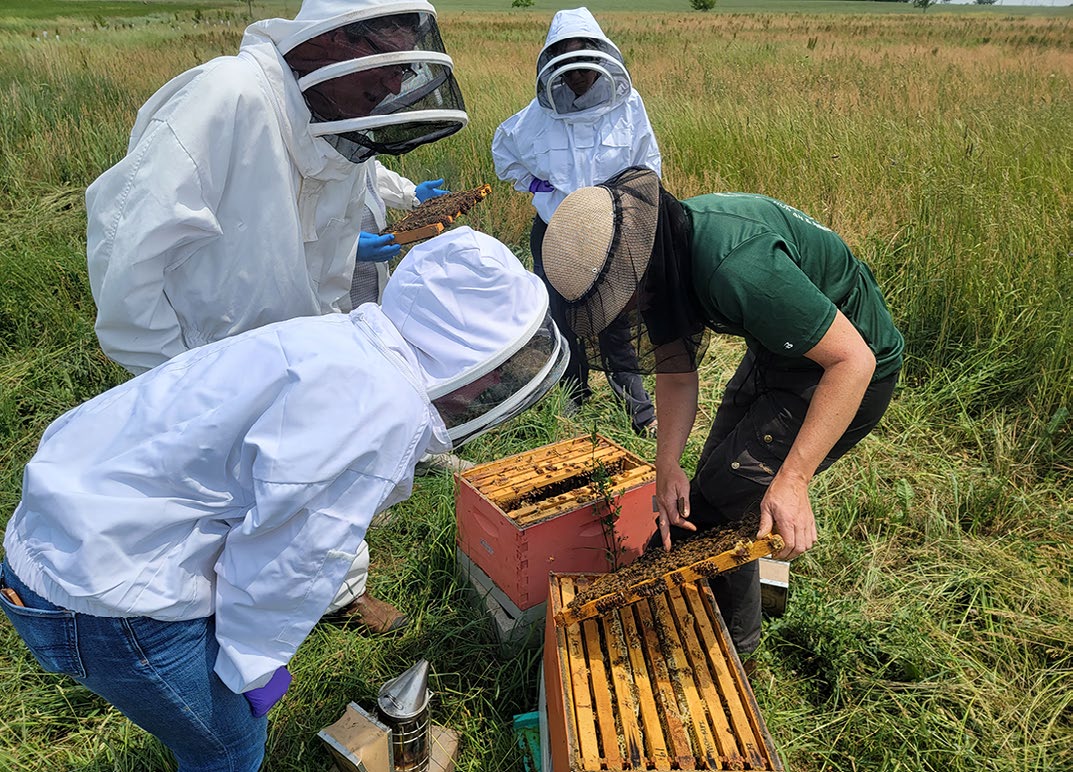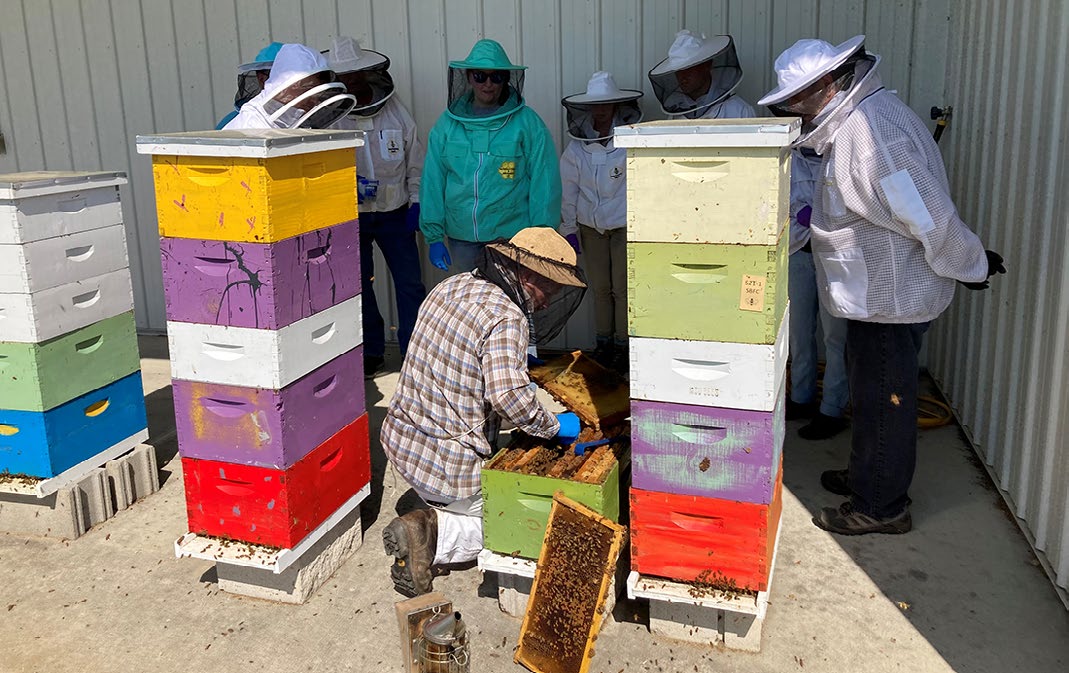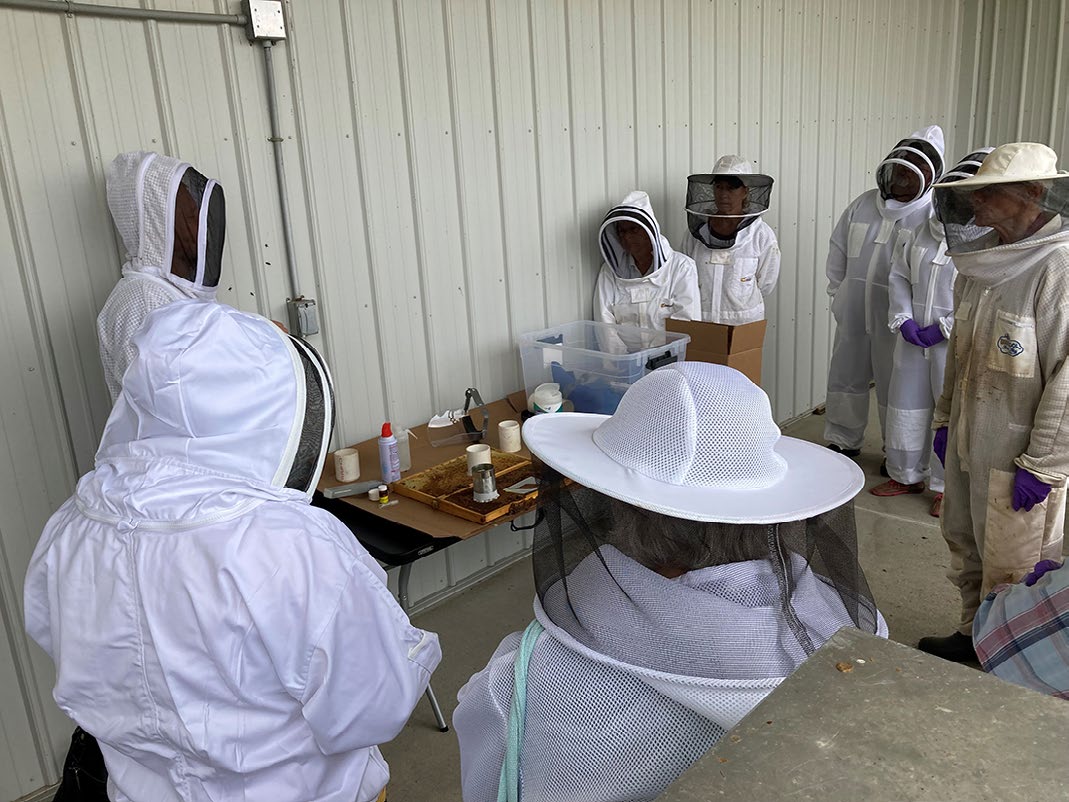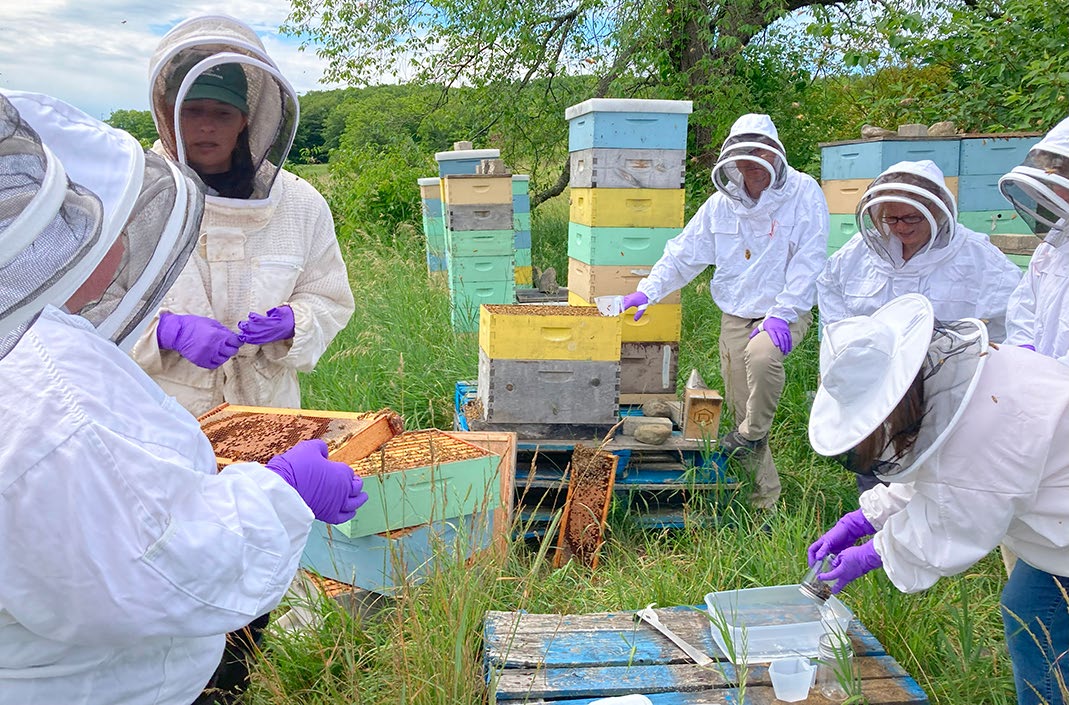
Supporting Beekeepers & Protecting Pollinators
DOWNLOADJune 4, 2024 - Michigan State University Extension
Impacts
- 80 MSU Extension pollinator programs in 2023.
- 8,500 participants in pollinator programs in 2023.
- 300 questions answered by MSU Extension about beekeeping and pollinators in 2023.
- 3.85 MILLION pounds of honey produced in Michigan in 2023.
- 70,000 honey-producing colonies in Michigan.
- 8TH Michigan ranked nationally in honey production in 2023.
Priority Areas
Michigan State University (MSU) Extension’s pollinator programming includes the following focus areas:
- Instruct beekeeping through webinars, in-person presentations and in-hive workshops.
- Share pollinator protection best practices with farmers, growers, gardeners and other pesticide users.
- Encourage land managers and home gardeners to grow flowering plants for pollinators.
- Support commercial beekeepers through applied research.
- Train veterinary practitioners in apiculture and honey bee medicine.
"The team clearly cares about bees and beekeepers and goes above and beyond to educate the beekeeping community. Many thanks!" -2023 Michigan Beekeeping Office Hours webinar participant
"I am so very grateful you all take the time to do this. It is beneficial and supportive of my efforts. I probably would not continue trying without access to the information and wisdom you all make available to me. Thank you from my honey bee heart!" -2023 Michigan Beekeeping Office Hours webinar participant
Reference
USDA NASS. (2024). Michigan honey production (News Release NR-24-16). https://www.nass.usda.gov/Statistics_by_State/Michigan/Publications/Current_News_Release/2024/nr2416mi.pdf
For more information, visit: www.pollinators.msu.edu/questions
Apiculture Education for Michigan Beekeepers
MSU Extension’s apiculture team provides information and resources for beekeepers to improve honey bee colony management practices and health outcomes. This outreach is delivered through presentations at beekeeping association meetings and conferences, webinars for beekeepers and in-hive beekeeping workshops.

Presentations at beekeeping association meetings and conferences
MSU Extension presents to beekeepers at beekeeping association meetings and statewide conferences. Every year, MSU Extension collaborates with the Michigan Beekeepers Association to host its spring and fall conferences. Hundreds of beekeepers statewide attend these conferences, most of whom maintain stationary beekeeping operations in Michigan.

Michigan is home to about 30 local beekeeping clubs. Many of these local associations invited MSU Extension to give presentations at their meetings. MSU Extension also works with Michigan’s large-scale, migratory beekeeping operations and hosted the 2023 Michigan Commercial Beekeepers Association’s annual meeting.

Webinars for beekeepers
MSU Extension hosted a series of webinars in 2023 for beekeepers. Each month from April through September, MSU Extension’s apiculture team discussed seasonal beekeeping topics and answered questions from beekeepers. The team also collaborated with the Michigan Beekeepers Association to host five webinars with guest presenters.
In-hive beekeeping workshops
MSU Extension delivered 11 in-hive workshops for beekeepers at three locations in Michigan during 2023. The workshops covered topics such as hive handling, colony inspections and integrated pest management.
- 94% of participants reported their knowledge of the subject increased as a result of the program (responses from 376 participants across 21 programs in 2023).
- 82% of participants reported their skill level increased as a result of the program (responses from 377 participants across 21 programs in 2023).
- 90% of participants reported they made a change that improved honey bee colony health as a result of information presented in the Michigan Beekeeping Office Hours webinars (responses from 68 webinar series participants).
Is Beekeeping Right for Me? online course
In 2023, MSU Extension launched the Is Beekeeping Right for Me? online course (https://www.canr.msu.edu/courses/msu-is-beekeeping-right-for-me). This online course introduces honey bees; covers the time required, physical demands and financial investment of beekeeping; and suggests ways to help all pollinators.
Pollinator Stewardship for Pesticide Users & Land Managers
MSU Extension encourages growers, pesticide applicators, home gardeners and the public to improve pollinator health by learning about pollinators, installing pollinator habitats and minimizing pesticide exposure. These efforts address needs and strategies identified in Michigan’s Pollinator Protection Plan.
Pollinator stewardship information for farmers, growers and other pesticide applicators
MSU Extension provides recommendations about protecting bees from pesticides and increasing pollinator habitat through presentations, posters and handouts at grower meetings and conferences.
Since 2020, MSU Extension has received funding from the North Central Integrated Pest Management Center to coordinate the national Managed Pollinator Protection Plans Working Group of individuals working on pollinator stewardship initiatives. This group includes members from over 20 states who work together to develop and promote pollinator protection education.
The working group has two online courses: Pollinator Protection for Pesticide Applicators (https://www.canr.msu.edu/courses/pollinator-protection) and Pollinator Protection for Land Managers (https://www.canr.msu.edu/courses/land-managers). Upon course completion, certified pesticide applicators in Michigan can request one restricted use pesticide credit.
Pollinator education for home gardeners and the public
MSU supports efforts of home gardeners and the public to improve pollinator health by learning about pollinators, planting flowers for pollinators and minimizing pesticide exposure. MSU provides information to pollinator enthusiasts, home gardeners and the public through its Pollinator Champions online course (https://pollinators.msu.edu/programs/pollinator-champions). In this free, self-paced course, individuals learn about pollinators in Michigan as well as why pollinators are important and what you can do to help them. After completing the course, individuals can choose to become Certified Pollinator Champions to receive presentation slides and handouts to teach others about pollinators.
- 99% of participants reported that their knowledge of the subject increased as a result of the program (responses from 136 participants across 11 programs in 2023).
- 99% of participants reported that they were considering making a change to improve pollinator health as a result of the information presented (responses from 163 participants across 12 programs in 2023).
"The info provided today gave me lots of good ideas for planting to support pollinators." -2023 Pollinator Stewardship Program participant
"This was very helpful for my personal activity on improving pollinator habitat! Thanks for sharing." 2023 Pollinator Stewardship Program participant
Honey Bee Medicine for Veterinary Practitioners
Veterinarians trained in honey bee medicine are needed to provide beekeepers access to antibiotics for honey bees. In 2017, changes in the federal code required beekeepers to receive an order from a veterinarian to access antibiotics for honey bee colonies. Prior to these changes, beekeepers had been able to access these medications directly from beekeeping supply companies. Honey bees can be affected by viral, fungal and bacterial diseases, and like other livestock, need access to medical care and treatments.
Trained veterinarians are not only needed to provide access to antibiotics for honey bees, but also to help address other issues with the honey bee health crisis, including optimizing nutrition and managing parasites. It can be difficult for beekeepers to find good care for their colonies since honey bee medicine is not covered by most standard veterinary schools. MSU trains veterinarians, veterinary students and veterinary technicians in honey bee medicine so they can serve beekeeper clients and support honey bee health.
MSU programs and collaborations that train veterinary practitioners in honey bee medicine:
- Honey bee medicine clinics for veterinary practitioners: MSU instructs hands-on clinics on honey bee handling, health and care for licensed veterinarians, veterinary technicians and veterinary students.
- Rotation in honey bee health for veterinary students: Since 2018, MSU has instructed an annual, three-week rotation in honey bee health for veterinary students in MSU’s College of Veterinary Medicine.
- Honey bee medicine veterinary student club: The MSU apiculture team regularly presents to and hosts hands-on workshops for MSU College of Veterinary Medicine’s honey bee medicine student organization.
- Honey bee medicine for veterinary practitioners online module: MSU and partner universities developed an online learning module on honey bee diseases and diagnostics for veterinary practitioners to work with beekeeping clients.
- Monthly conversations between veterinarians serving beekeepers: MSU participates in monthly, virtual meetings with veterinarians in Michigan who keep bees and are working toward serving more beekeeper clients.
- Collaboration with honey bee veterinary consortium: MSU has a seat on the education committee of the national Honey Bee Veterinary Consortium, and MSU hosted its virtual and in-person conference of veterinarians in August 2022.
- Kits for veterinary practitioners: MSU created and distributed kits for veterinary practitioners that included beekeeping supplies, diagnostic kits and field guides.

- 100% of participants reported they increased their knowledge of how to perform a basic hive inspection as a result of the workshop (41 responses).
- 90% of participants reported they understood resources available to them as a result of the workshop (41 responses).
- 88% of participants reported they were considering taking on new clients who are beekeepers (40 responses).
"The program was great and very comprehensive. The take-home kit and additional resources provided were excellent. If I have an opportunity to work with local beekeepers, I will definitely take it!" -2023 Honey Bee Medicine for Veterinary Practitioners Clinic participant
"I highly value the question-and-answer session, during which all inquiries are addressed with care and generosity. The atmosphere is warm and laid-back." -2023 Michigan Beekeeping Office Hours webinar participant
"Thank you, please continue with these sessions, they are a great way to keep up to date with beekeeping practices and research." -2023 Michigan Beekeeping Office Hours webinar participant
"I really enjoyed the workshop! It was fun to meet so many other veterinarians interested in honey bee medicine both from local clinics and out of state. The information provided in the workshop was just what I needed and was discussed at a good pace. I enjoyed the hands-on aspect of working with bees and also getting to see a honey processing facility in action during the workshop. Thank you for putting on a great experience!" -2023 Honey Bee Medicine for Veterinary Practitioners Clinic participant
Acknowledgements
Thank you to the Michigan Department of Agriculture and Rural Development for securing funding from the U.S. Environmental Protection Agency for Michigan State University to implement strategies in the Michigan Managed Pollinator Protection Plan.
This work is supported by the USDA National Institute of Food and Agriculture, Crop Protection and Pest Management Program through the North Central IPM Center (2018- 70006-28883).
This work is supported by the Crop Protection and Pest Management Program [grant no 2021-70006-35450] from the USDA National Institute of Food and Agriculture.
This work is supported by the Enhancing Agricultural Opportunities for Military Veterans grant, award no. 2021-77028-35274 from the USDA National Institute of Food and Agriculture.
This work is created with funding from the Veterinary Services Grant Program (VSGP) Education, Extension and Training (EET) competitive grants program of the USDA National Institute of Food and Agriculture (NIFA) (2202-04170) and the USDA NIFA Sustainable Agriculture Research and Education (SARE) Research and Education Grant program (LNC22-468).
Any opinions, findings, conclusions or recommendations expressed in this publication are those of the authors and do not necessarily reflect the view of the USDA.



 Print
Print Email
Email




